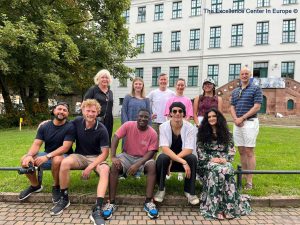Refugees’ Law in Germany: Are you interested in learning about the German laws and regulations governing refugees in Germany, and how Germany confronts the issues created by a large influx of refugees from war-torn countries? Would you like to learn first-hand the challenges faced by refugees striving to assimilate into German life? If your responses to these questions are positive, we offer you a unique opportunity.
Out of all the Western European nations, Germany has hosted the largest number of refugees fleeing war-torn countries in search of a land to establish stable and peaceful lives. This overwhelming influx of peoples has posed significant challenges for the German authorities. As a result of this influx, Germany has been required to enact regulations and laws that address various issues for refugees.
The German law of refugees has gone through many changes in the past five years. Initially, the law was encouraging to refugees seeking asylum; as time passed, however, the law has become stricter and more exacting.
Refugees’ Law in Germany program presents a great opportunity for lawyers, prosecutors, judges, legal researchers, and all those who are interested in the legal field pertaining to refugee status in Germany. It is an opportunity for interested persons to acquaint themselves with the laws and regulations applied by the German authorities to incoming refugees.
The relationship between German law and international treaties and conventions is presented, as well as the changes that have occurred throughout the last few years and the effect those changes have had on the rights of refugees, particularly as compared to international treaties and their stipulations to which Germany is a signatory. Participants will learn appropriate procedures in the granting of
Overview of Asylum Procedures in Germany
In Germany the right to asylum is defined in Article 16a. This article applies to persons who are subjected to political persecution in their country of origin. Article 3 of the Asylum Act also provides for a right to protection; for example, there is a right of protection for those, such as Syrians, who are fleeing the Islamic State (ISIS). Generally, refugee protection is granted on the basis of the Geneva Convention on Refugees. Other protections granted in asylum procedures are sub-protection or suspension of deportation. These protections are granted on the basis of the country of origin. In such cases, a residence permit is issued for one year.
What does this program include?
- You will learn about the German law of refugees, regulations and German policies.
- You will meet with people who work or have worked in this field, and you will be able to engage with them and ask questions.
- You will meet refugees in the city of Halle and interact with them.
- You will learn Germany’s integration policies.
- You will become acquainted with German culture and its lifestyle by living it.
- You will receive three hours per week of German language instruction with a qualified instructor.
- You will participate in social and community activities organized by the Center.
- You will live with a host family and be immersed in the family’s culture and daily routine.
Is there a deadline to apply? How long can I participate in a program?
Refugees’ Law in Germany program has no deadline for application, which means that you can apply to the program year-round. In addition, for maximum flexibility, you choose your start and end dates. The minimum period of participation is two weeks, but you may participate for up to three months.
Program’s fees (Euro):
| Duration | Cost (Euro) |
| Two weeks | 600 |
| One month | 1,100 |
| Two months | 1,850 |
| Three months | 2,750 |
The program fee includes: Pre-departure support, accommodations for the duration of your program, some meals, full coordination while interning in Germany, and some sightseeing in the city of Halle.
Who is eligible to apply to this program?
The Refugees’ Law in Germany Program is open to all persons between the ages of 18 and 75 years old. People of all nationalities, employment and educational backgrounds are welcome to apply. No academic degree is required for participation in this program.
Which Airport Should I fly to?
The easiest way to get to the Excellence Center in Germany is to fly to Leipzig/Halle Airport. From the airport it is about a 25 minute train ride to the Center.
If you are coming from one of Berlin’s airports, there are two choices for traveling to the Center in Halle. First, you may choose to travel by a bus operated by companies, such as FlixBus or Meinfernbus. A bus ride will take about two hours. Your second choice is to take a train from the Berlin-Central station; this ride takes around one and a half hours.
Do I have to obtain a visa to enter Germany?
If you are coming from a European country that has signed the Schengen agreement, then you don’t need a visa to Germany. For those who come from countries which are part of the visa-free program, then you may enter Germany for up to three months.
If your need a visa to enter Germany, then you need to apply for a Schengen visa. This visa will allow you to enter Germany for a maximum period of three months (90 days). This visa does not permit you to acquire employment (not even as a freelancer). Check with your consulate website to determine which type of visa you qualify under.
How do I apply for this program?
All you need to do is send an email to info@eceurope.org Please type in the subject line “Refugees’ Law in Germany Program”. We will soon send you an application form.
Should you have any questions, please do not hesitate to contact us at Info@eceurope.org
WhatsApp: +49-176-39353950
Excellence center’s Instagram account: https://www.instagram.com/ec.europe/
For more information, please visit our website: https://eceurope.org/
Excellence Center’s Facebook page: https://www.facebook.com/eceurope/
Watch us on YouTube: The Excellence Center



